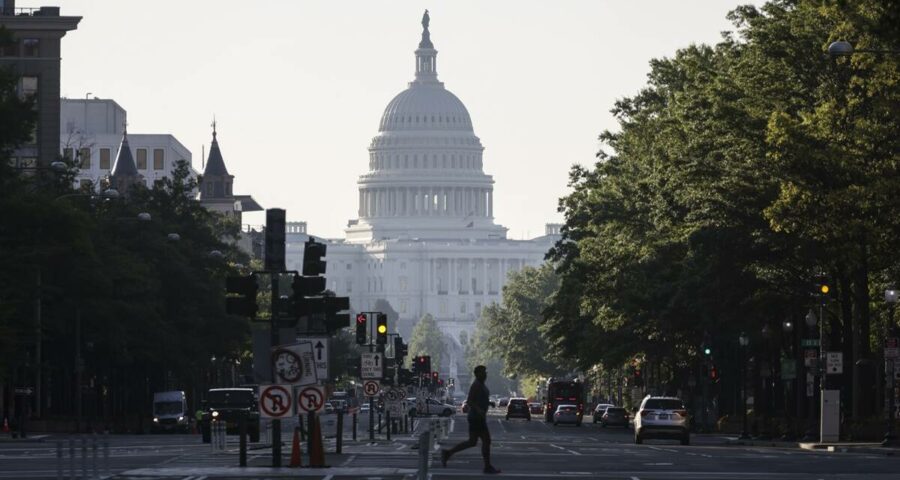The House and Senate have a long history of putting off pressing matters until the very last minute, making difficult decisions and casting tough votes only when it is finally and completely unavoidable.
Congress disposed of a looming global economic catastrophe this week by doing what it does best: not much.
After weeks of a market-threatening partisan stare-down, Senate leaders struck a not-so-grand bargain that raised the debt ceiling into early December, just two short months away. If history is any guide, lawmakers will then engage in the exact same fight all over again — and may even end up with yet another Band-Aid solution.
That kick-the-can-ever-so-slightly-down-the-road debt deal followed the House’s nonconsideration last week of a bipartisan infrastructure bill after a promised vote. The delay meant blowing through a Sept. 30 deadline to keep federal highway programs funded, but not to worry: Congress bought itself a whole month with a temporary 30-day patch that will give Democrats more time to resolve deep differences among them over a huge social safety net measure that may or may not come together by Oct. 31.
It all unfolded just as Congress narrowly averted a government wide shutdown by just hours last week, passing a temporary bill to fund federal agencies through Dec. 2 to give itself more time to haggle over the 12 annual spending bills. That fight will inevitably collide with the battle over the debt limit, the big social policy bill and the infrastructure legislation.
Congress is headed toward more cliffs than Wile E. Coyote.
The House and Senate have a long history of putting off pressing matters until the very last minute, making difficult decisions and casting tough votes only when it is finally and completely unavoidable.
But this current Congress seems particularly paralyzed, given ideological differences among Democrats holding the barest of majorities and entrenched opposition from Republicans who are fixated on next year’s elections and see a little legislative chaos as their return ticket to the majority.
“Washington Democrats are proving they cannot deliver,” Sen. Mitch McConnell, R-Ky. and the minority leader, declared Thursday on the Senate floor, omitting the fact that he was doing everything in his power to make sure that they did not.
The result is that, rather than strike compromises on pressing issues, lawmakers have grown accustomed to agreeing to disagree, skirting politically difficult decisions and choosing a date in the future when they will be forced to try again, often with the same outcome. No household or business could operate that way, but for Congress, lurching from crisis to crisis is a way of life.
On the plus side for senators, the debt ceiling agreement preserved the Columbus Day recess, which includes a Republican retreat scheduled for next week in Florida and other travel planned by senators. But Christmas is in real trouble.
The debt deal surfaced because McConnell began to fear that he might have taken his debt-limit intransigence too far, straying a bit too close to the edge of a particularly daunting cliff.
He feared that the two Democratic holdouts in favor of the filibuster — Sens. Joe Manchin, D-W.Va., and Kyrsten Sinema, D-Ariz. — would finally cave to pressure from the rest of their party to approve an exception to the filibuster rules for raising the legal cap on federal borrowing if confronted with an imminent fiscal disaster.
And everyone on Capitol Hill knows that a carve-out for one kind of legislation will ultimately become an avenue for every kind of legislation. McConnell, who is also very enamored of the filibuster, knew he had to head off that possibility at all costs.
“His No. 1 priority is to protect his instrument of obstruction,” said Sen. Chris Van Hollen, D-Md.
Things are so bad that even the bare-bones debt agreement barely came together. Top lawmakers and their aides spent hours haggling over it, and Republicans struggled to gain commitments from their members to clear the way for a vote.
Most Republicans did not want to be anywhere near the debt-ceiling increase that has come under attack from former President Donald Trump, making it politically radioactive in their eyes. For a time, Republicans were not sure they could produce the minimum 10 votes from their side to move it along procedurally.
Take Rep. Kevin Cramer, R-N.D. Approached by reporters, Cramer launched into extended praise of the short-term debt limit increase proffered by McConnell. He called it elegant, lauding the Senate leader’s craftiness in preserving the filibuster and depriving Democrats of a potent political argument against his party. It also averted a potential calamitous default. But Cramer still would not vote to allow it to move forward.
“I don’t think I will,” he said.
Source: Read Full Article


